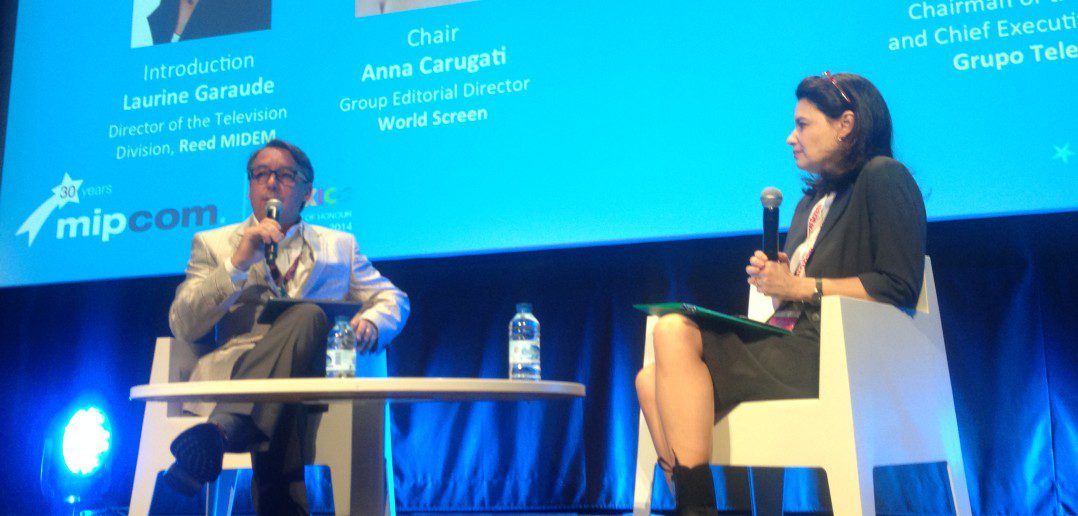Left to right: Emilio Azcarraga Jean, chairman of the board and chief executive officer, Grupo Televisa; and moderator Anna Carugati, group editorial director, World Screen.
Laurine Garaude, director of the television division of Reed Midem, introduced Emilio Azcarraga Jean in this enlightening session on the evolution of the content industry in Mexico.
Azcarraga Jean kicked off on a strong note. “The content industry is the most value-added industry in the region,” he began, not least because of the “strategic closeness of the US,” where nearly 60 million people speak Spanish, and the vast majority are of Mexican origin.
“It’s a land of opportunities for us as Mexicans, but also for the international market,” he said.
And the mixing of those two cultures, English-speaking with Mexican roots, directly affects Televiso’s offerings. “It’s incredible the amount of tweets or interactions done in English, even though the programme is in Spanish,” Azcarraga Jean observed. “So you see the importance of the bilingual community and their preferences: they watch the content in Spanish but use English to interact.”
Which makes presence across platforms all the more important. “I believe we need to try every new technology,” even if the technology might not be there for long, said Azcarraga Jean. “The storytelling process is the same, but… we can optimise the use of windows, which means not just producing for over-the-air, but for certain platforms only. Also, we can use these platforms for a second-screen idea that empowers you to interact as much as possible with the viewer. This builds a better experience with the viewer and gives us a lot of input into the programme for changes.”
Asked by Carugati how he sees user-generated content and professional content evolving in the future, Azcarraga Jean replied, “YouTube started as short-form user-generated videos. A lot of people said the future was there, and professional content wasn’t going to come close. Now you see all those videos produced by the public, but in the end, most of the content that people are consuming is professional content.”
He added that around an aired programme a lot of conversations occur, and timeshifting makes consumption more easy. “If you really have the most distribution platforms that you can have for your content, you’ll be in a great place for the future,” he said. “It’s not just a question of quality production but how you deliver it to the end user — and how fast. You need to understand how each platform works and how users use them.”
He was careful to underline that this isn’t just about opening a Facebook or Twitter page; “it’s about how to use that second or third screen to give them a stronger experience. And obviously, there’s the time-shifting,” which means people can watch content on any device they want, at any hour they want.
So to create a better experience, it’s important to understand these two influences: the use of technology (like timeshifting), but also technology’s role — how it imposes rules on content. On Instagram, for example, you can make videos limited to 15 seconds.
“To create a better experience, we really need to access second- and third-screens,” said Azcarrata Jean. Which is why in 2015, Televiso plans to launch a show where tablet use plays an integral role.
“If you have a tablet and access to the internet, you have a greater experience. But you’re not gonna lose anything if you just watch TV,” he qualified.
The upcoming show is called “Logout“. In the trailer, a woman is kidnapped for mysterious reasons by two thuggish men who seem to be looking for money. You can use your phone or iPad to see what the kidnappers are doing on their phones. But you can also see footage from security cameras, which provide insight into events you can’t see on your TV screen — for example, what happens when the heavies drag the woman behind a closed door.
“It’s a very interesting experience,” Azcarraga Jean said.
“And it’s nice to see a kick-ass woman,” Carugati added. “I don’t know how you translate that into Spanish.”
The chairman laughed. “Kickass is a universal word,” he replied.




